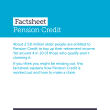A private pension is a way for you or your employer to save for your later life. If you have a private pension, you may have to make decisions about how you want to receive it when you retire.
Pensions
There are two main types of private pension:
- defined contribution – a pension pot based on how much is paid in
- defined benefit – a pension pot based on your salary and how long you’ve worked for your employer.
What you’ll get
Defined contribution pensions can be workplace pensions or private pensions that you arrange. The money paid in is put into investments by the pension provider. What you’ll get depends on:
- how much you paid in
- how well the investments have done
- how much the provider charges for managing your pot
- how you decide to take the money.
Defined benefit pensions don’t depend on investments. They are based on your salary and how long you worked for your employer.
If you're over age 55, you can usually get 25% of your pension pot tax free. If anyone tells you that you can take your money out before age 55, this may be a sign of a scam.
Annuities
If you have a defined contribution pension, you'll have to decide what to do with it when you retire. One option is to buy an annuity with some or all of your pension pot. An annuity pays a regular guaranteed income for a set period or for life. What you’ll get depends on a number of factors, including:
- your age and gender
- the size of your pension pot
- interest rates
- your health (sometimes).
You don’t have to buy an annuity from your pension provider. It's important to shop around in order to make the most of your money because, when you buy an annuity, you can’t change it later. MoneyHelper has more information about shopping for an annuity.
Flexible options
If you have a defined contribution pension, you no longer have to buy an annuity. You can choose to withdraw all or some of their money as a lump sum or receive payments as income over time. Scammers may try to take advantage of this – see our webpage How to avoid a scam for tips on spotting scams and protecting yourself. If you do plan to take a lump sum from your pot, it's also important to consider how this may affect taxes and your eligibility for certain benefits. You can find more information on MoneyHelper.
Financial Advice
You can decide what to do with your pension pot yourself and a good first step is to have a free Pension Wise appointment from Government-backed MoneyHelper. Pension Wise is an impartial service and will explain the options available with your pot and how they are taxed.
If you decide that you would like some professional help, it’s important to only ever deal with an adviser who is regulated by the Financial Conduct Authority. Contact MoneyHelper, the Society of Later Life Advisers or Unbiased to find a regulated adviser. Keep in mind that the financial adviser may charge a fee and it is worth shopping round advisers to find one who is right for you.
Finding lost pensions
If you changed jobs a number of times when you were working, you might have a pension with more than one employer. The government-backed Pension Tracing Service is free and can help you track down a lost pension. You'll need the name of the employer or the pension provider.
The Pension Tracing Service won’t tell you if you have a pension. You'll have to contact the pension administrator yourself to find out.
Next steps
Visit the MoneyHelper website for information and guidance on pensions.
The Pension Tracing Service helps you find lost pensions.


